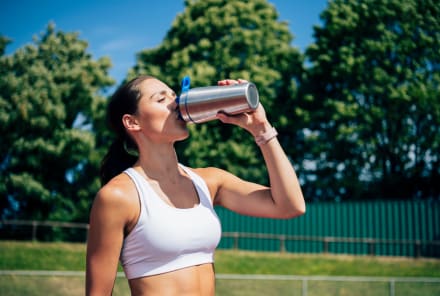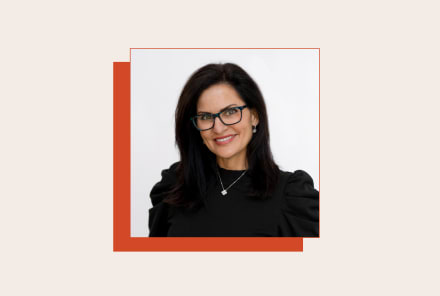Advertisement
The Best Vitamins For Tiredness & Lack Of Energy, According To RDs


If you, like more than one-third of American adults1, struggle to get enough sleep on a daily basis, you've likely experienced your fair share of sluggish days. You know the ones: days when you feel downright exhausted and lethargic, as if your brain and body are moving glacially. But, here's the thing: You don't necessarily have to have sleep health concerns to deal with these types of days regularly. In fact, poor shut-eye is only one reason for tiredness and lack of energy. Another cause of suboptimal energy levels? Lacking certain vitamins and minerals.
"Nutritional deficiencies can cause low energy and occasional fatigue because your body's trillions of cells rely on vitamins and minerals to generate energy," explains Samantha Ferguson, M.S., R.D., L.D., a registered dietitian and dietitian nutrition coach at Wellory. "Different factors such as stress, exercise, alcohol, environment, and undereating can deplete your vitamin and mineral stores, so it's important to ensure you are replenishing these stores to feel your best and most energized."
The first way to do just that is by eating a well-rounded, balanced diet that's rich in whole foods, Ferguson says. "It's important to try to get these vitamins and minerals from food first, as food's a complex source of vitamins, minerals, and phytochemicals that all work synergistically to provide the most bioavailable forms of those vitamins and minerals."
But if your diet is up to snuff and you're still struggling with tiredness, adding supplements to your routine might help resolve any shortages of nutrients and, in turn, boost your energy as needed. The only way to truly know whether or not your levels of certain nutrients are low, however, is to have them tested. So, before popping any capsules or mixing any powders, it's a good idea to consult your general health care provider, who can administer a blood test to determine any deficiencies and recommend the ideal dosage and product based on your test results and overall health.
In the meantime, this article's got you covered with the best vitamins (and minerals) for tiredness and lack of energy—all of which are backed by science and recommended by nutrition pros.
Vitamin B12
Along with the seven other B vitamins, vitamin B12 (aka cobalamin, or methylcobalamin in its activated form) works to "break down the foods we eat and turn them into energy,"* says May Zhu, RDN, LDN, registered dietitian nutritionist and founder of Nutrition Happens. This energy is in the form of adenosine triphosphate (ATP), which is essentially the main energy currency that keeps your cells (and whole body) going.
Vitamin B12 also supports the formation of red blood cells, adds Zhu.* This is key for helping the body get enough oxygen-rich blood and maintain a sufficient amount of red blood cells. With suboptimal oxygenated blood or red blood cells, you may feel tired and in need of adequate energy.
While the highest concentrations of B12 are found in animal products—such as meat, eggs, seafood, and dairy—many non-animal foods are also fortified with the nutrient (e.g., breakfast cereals and nutritional yeasts). Still, reaching optimal levels of vitamin B12 through diet alone can be a challenge for plant-based eaters, which is why the National Academies recommends vegans and vegetarians consider coupling any vitamin-B12-rich eats with supplementation to meet the recommended dietary amount (RDA) of 2.4 micrograms per day for adults.
In addition to a high-potency dose of B12, mindbodygreen's focus+ combines caffeine from organic whole coffee cherry and coffee beans, Panax ginseng, guarana, and L-theanine to deliver a steady stream of energy all day long to both your body and mind.*
Vitamin B6
Another member of the B vitamin complex, vitamin B6 (pyridoxal 5-phosphate in its active form) can increase the production and release of a handful of energizing neurotransmitters—including dopamine, norepinephrine, and serotonin2, according to a 2008 Cells scientific review. "The nutrient also plays an important role in your metabolism and the release of energy from food by converting glycogen (the stored form of carbohydrates) into glucose (the main energy source)," Ferguson explains.
Unlike B12, B6 is readily available in a variety of animal and plant sources—including poultry, seafood (e.g., tuna and salmon), chickpeas, dark leafy greens, bananas, and more. So, getting your fill of this vitamin through foods shouldn't be that difficult, especially since the RDA for adults ages 19 to 50 is only 1.3 milligrams per day. (For comparison, a ½-ounce serving of salmon has 1.26 micrograms of vitamin B63, according to the United States Department of Agriculture.)
Vitamin D
Vitamin D not only boosts mood and supports a healthy immune system, but it can also help keep your energy levels stable, says Valerie Agyeman, R.D., dietitian and host of the Flourish Heights podcast.
"In fact, low energy and occasional fatigue are common in people with vitamin D deficiency," Agyeman explains. That might be because vitamin D helps mitochondria (the powerhouses of the cell that create energy) use oxygen, thus helping to provide energy to many body parts—including muscles, she adds.
Unless you live near the equator and spend lots of time outdoors, you're likely not getting enough daily vitamin D. Just take it from research, which has found that 29% of American adults4 are vitamin D deficient and 41% are vitamin D insufficient.
And to make matters worse, vitamin D is minimal in foods. Sure, you can find it in fatty fish (like salmon), eggs, and fortified foods (e.g., breakfast cereals, milk, and orange juice). But you likely need to take a high-quality vitamin D3 supplement in tandem to reach the optimal daily vitamin D intake goal of 5,000 IU. And if you do add a vitamin D supplement to your repertoire, Ferguson recommends taking it while eating a meal that has fat to enhance nutrient absorption (or, even better—choose mindbodygreen's vitamin D3 potency+, which has an organic trio of olive, flaxseed, and avocado oil built right into its formula to optimize bioavailability).*
Magnesium
Considering it's involved in over 300 enzymatic reactions5 in the body (per a 2017 Scientifica review), it might not come as a shock to learn that magnesium, in Agyeman's words, is a key player in energy creation: "Magnesium helps convert food into energy and is needed for the production of ATP," she explains. (Remember, ATP is the fundamental unit of energy within cells.)
So, it makes sense that without ample amounts of magnesium in your body, you're more likely to feel drained. After all, your body doesn't have enough of what it needs to make the compound that powers your cells.
The good news? Magnesium can be found in a variety of foods, including dairy products, legumes, seeds, whole grains, and leafy vegetables. The not-so-good news? It's estimated that the standard U.S. diet contains only about 50% of the RDA for magnesium, which is 400-420 milligrams for men and 310-320 milligrams for women.
If you're failing to meet your daily magnesium needs, supplementation could help; just make sure to opt for the right type of magnesium supplement (of which there are many). For example, Zhu calls out magnesium malate as best for boosting energy, while Ferguson says magnesium glycinate can help support healthy sleep (which, in turn, can also help with your energy levels).
Iron
Iron is responsible for making hemoglobin, a protein in red blood cells that helps transport oxygen throughout the body. "When the body is low on oxygen, the tissues, muscles, and cells will lack oxygenation and blood flow, causing you to feel more tired," Ferguson explains.
Packing your plate with iron-rich foods—such as lean meats, seafood, poultry, fortified products (e.g., cereals and breads), beans, and nuts—can help you maintain healthy iron levels and steer clear of any iron-related lulls in energy. To boost absorption of this critical mineral, consume iron-rich foods alongside vitamin-C-rich foods (like citrus fruits, red peppers, broccoli, and tomatoes), Ferguson recommends.
And for all those folks who don't eat meat, poultry, and seafood, keep in mind that you'll need almost twice the recommended daily intake for meat eaters (i.e., 18 milligrams per day for menstruating adult women and 8 milligrams for adult men and postmenopausal women, according to the National Academies). That's because the body doesn't absorb the non-heme iron found in plant foods as well as the heme iron found in animal foods.
Frequently Asked Questions
What vitamin deficiency causes tiredness?
There isn't necessarily one singular vitamin deficiency that causes tiredness. Rather, a lack of energy can be brought on by deficiencies or low levels of certain nutrients—including that of vitamin B12, vitamin B6, magnesium, iron, and vitamin D.
Is B12 good for tiredness and lack of energy?
In short: Yes. "B12 helps transform the food you eat into energy that your cells use up in the body," Agyeman explains. "It also helps with red blood cell development," to ensure your body continues to receive ample oxygen-rich blood (via red blood cells) so it can operate efficiently and with optimal energy.*
How much vitamin B12 should I take for energy?
It's important to note that vitamin B12 doesn't directly provide energy. Instead, it provides the body with the tools needed to create and maintain sustainable energy. B12 does this by helping to convert the foods you consume into usable energy, as well as supporting the formation of red blood cells, which ensures a steady delivery of oxygen-rich blood throughout the body so you have ample energy.
The RDA of vitamin B12 for adults is 2.4 micrograms, per the National Academies. Ensuring your body has sufficient levels of vitamin B12 can help you stay energized throughout the day.
The takeaway
There are several reasons you might experience tiredness, one of which is falling short on key nutrients. "There are some vitamins that may have a direct effect with your energy levels, and it may be noticeable—especially if you're already deficient. Others may contribute toward certain processes that help create and maintain energy," Agyeman shares.
Iron, for example, is responsible for making hemoglobin, a protein in red blood cells that helps transport oxygen throughout the body. When you don't have enough iron, your body doesn't receive enough oxygen-rich blood and, as a result, you can start to feel tired. Other nutrients that can impact your energy levels include vitamin B12, vitamin B6, vitamin D, and magnesium. As such, these nutrients are some of the best vitamins for tiredness and lack of energy.
When addressing any nutritional insufficiencies or deficiencies, you should first try to get the vitamins and minerals you need on a daily basis through whole foods. Adding supplements (such as mindbodygreen's focus+, which delivers 360 micrograms of vitamin B12 and other energizing phytonutrients and botanicals) to your routine can help resolve any shortcomings of nutrients and, in turn, promote optimal energy levels.*
5 Sources
- https://www.cdc.gov/media/images/releases/2016/p0215-enough-sleep.pdf
- https://www.ncbi.nlm.nih.gov/pmc/articles/PMC6071262/
- https://fdc.nal.usda.gov/fdc-app.html#/food-details/175167/nutrients
- https://www.cambridge.org/core/journals/british-journal-of-nutrition/article/vitamin-d-deficiency-and-insufficiency-among-us-adults-prevalence-predictors-and-clinical-implications/44E436843510FE6BDE856D5BCB9C651F
- https://www.ncbi.nlm.nih.gov/pmc/articles/PMC5637834/
Watch Next
Enjoy some of our favorite clips from classes
Enjoy some of our favorite clips from classes
What Is Meditation?
Mindfulness/Spirituality | Light Watkins
Box Breathing
Mindfulness/Spirituality | Gwen Dittmar
What Breathwork Can Address
Mindfulness/Spirituality | Gwen Dittmar
The 8 Limbs of Yoga - What is Asana?
Yoga | Caley Alyssa
Two Standing Postures to Open Up Tight Hips
Yoga | Caley Alyssa
How Plants Can Optimize Athletic Performance
Nutrition | Rich Roll
What to Eat Before a Workout
Nutrition | Rich Roll
How Ayurveda Helps Us Navigate Modern Life
Nutrition | Sahara Rose
Messages About Love & Relationships
Love & Relationships | Esther Perel
Love Languages
Love & Relationships | Esther Perel
What Is Meditation?
Box Breathing
What Breathwork Can Address
The 8 Limbs of Yoga - What is Asana?
Two Standing Postures to Open Up Tight Hips
How Plants Can Optimize Athletic Performance
What to Eat Before a Workout
How Ayurveda Helps Us Navigate Modern Life
Messages About Love & Relationships
Love Languages
Advertisement

This Type Of Fat Is Vital For Women's Health — Are You Getting Enough?
Molly Knudsen, M.S., RDN

New Study Confirms The 3 Habits That Age Your Brain Faster
Molly Knudsen, M.S., RDN

This Type Of Fat Is Vital For Women's Health — Are You Getting Enough?
Molly Knudsen, M.S., RDN














